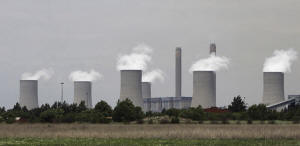|
Deteriorating rail systems, jammed ports and frequent blackouts
have hindered vital industries like mining and auto
manufacturing in South Africa, contributing to slow economic
growth over the last decade in Africa's most developed economy.
South African President Cyril Ramaphosa and his coalition
government have pledged to tackle corruption and decades of poor
management as well as pursue reforms to get the country out of
its economic rut and ease its extremely high unemployment rate.
While it did not give specifics, the South African government
said it expects the World Bank loan will enable inclusive
economic growth and job creation by assisting in the removal of
important infrastructure bottlenecks, especially in the energy
and freight transportation sectors.
“This agreement reinforces the strong and constructive
collaboration between the World Bank and the government of South
Africa,” said the National Treasury. “This partnership marks a
significant step toward addressing South Africa’s pressing
economic challenges of low growth and high unemployment."
Additionally, because the financing has better conditions than
conventional borrowing, such as a three-year grace period, it
should reduce escalating debt-service expenses, it added.
South Africa’s 2025-26 budget has allocated over R1 trillion
over the next three years toward critical transportation,
energy, water and sanitation infrastructure while improving
access to basic services.
However, real gross domestic product was revised downward to
1.4% in 2025 from 1.9% previously projected by the Finance
Ministry projected in March because of the worsening global
outlook and the persistence of logistics constraints and higher
borrowing costs.
Finance Minister Enoch Godongwana said government debt is
projected to stabilize at 77.4% of GDP in 2025/26.
Earlier this year, the dismantling of USAID by the Trump
administration cut around $436 million in annual funding to
South Africa for HIV treatment and prevention, putting the
program and thousands of health care jobs on the line.
Godongwana said the country doesn’t have the funds to cover the
more than $430 million shortfall caused by the Trump
administration’s cuts in foreign aid, which have threatened the
vast network of support for one of the world’s largest
HIV-positive populations.
All contents © copyright 2025 Associated Press. All rights reserved

|
|




